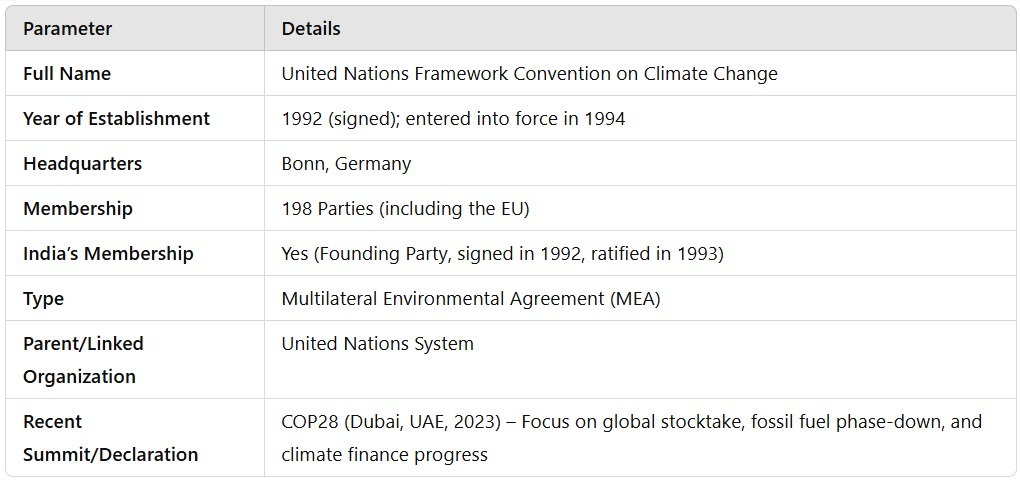2. United Nations Framework Convention on Climate Change (UNFCCC)


Key Objectives and Mandate
UNFCCC is the primary international treaty to combat climate change. It emerged from the 1992 Earth Summit (Rio de Janeiro) and aims to stabilize greenhouse gas concentrations to prevent dangerous anthropogenic interference with the climate.
Key focus areas:
Global cooperation on mitigation, adaptation, capacity building, and climate finance
Operates on the principle of Common but Differentiated Responsibilities (CBDR-RC)
Supports developing nations via technology transfer and funding mechanisms
Organizational Structure
Conference of Parties (COP) – Apex decision-making body; annual sessions
Subsidiary Bodies:
SBSTA (Scientific and Technical Advice)
SBI (Implementation)
Secretariat: Facilitates implementation; located in Bonn
Linked Legal Instruments:
Kyoto Protocol (1997) – Binding targets for developed countries
Paris Agreement (2015) – Voluntary NDCs, Net-Zero targets
Doha Amendment, Glasgow Pact, Sharm el-Sheikh Plan
India’s Role and Relevance
India is a founding member and key voice for the Global South
Advocates strongly for equity, CBDR, and climate justice
Submitted Updated NDCs in 2022:
50% installed electricity capacity from non-fossil sources by 2030
Reduce emissions intensity of GDP by 45% (from 2005 levels)
Achieve Net Zero by 2070
Introduced the LiFE (Lifestyle for Environment) Mission globally
Member of BASIC, LMDC, and initiator of CAMP (Coalition for Disaster Resilient Infrastructure)
Key Initiatives and Development
COP28 (2023):
Conducted first Global Stocktake
Operationalized Loss and Damage Fund
Contentious debate on fossil fuel phase-down
COP27 (2022):
Focus on climate adaptation and resilience finance
Long-Term Low Emissions Development Strategy (LT-LEDS) submitted by India
Expansion of Article 6 mechanisms (carbon markets
Additional Facts
UNFCCC classifies countries as Annex I, Annex II, Non-Annex
Paris Agreement is legally binding in process, but non-binding on outcomes (NDC targets)
COP21 (Paris) and COP26 (Glasgow) were landmark events
India hosted COP8 (2002) – Released the Delhi Ministerial Declaration
Relevance for UPSC Exam
Prelims: High frequency of questions on COPs, NDCs, treaty mechanisms, India’s targets, and groupings
Mains (GS2/GS3):
Role in climate governance, climate diplomacy, carbon equity
GS3: NDCs, carbon markets, and India’s strategies under Paris Agreement
Essay & Interview: Useful in topics like Climate Justice, Global South & Equity, Multilateralism in Environment
